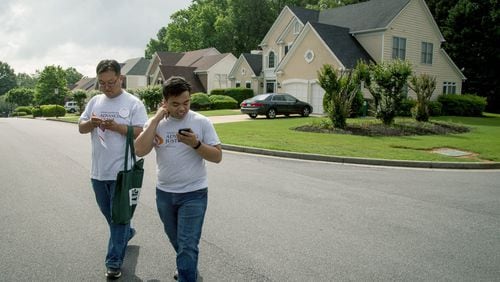Groups seeking to sign up more voters in Georgia's 6th Congressional District have been out in force over the past week in front of grocery stores and going door to door, trying to take advantage of a judge's order reopening voter registration in metro Atlanta's northern suburbs.
The push is only going to continue, although it comes as unregistered voters in these parts may be hard to find. An analysis by The Atlanta Journal-Constitution has shown an already highly motivated — and registered — district. The 6th likely has a lower percentage of unregistered voting-age residents (those 18 years and older) living in it than any of the state's other congressional districts.
But some of the groups believe there could be tens of thousands of people who are eligible but not on the rolls.
“We’re kind of scrambling to make the most of this new opportunity,” said Raymond Partolan with Asian Americans Advancing Justice — Atlanta, one of five civil rights and voting rights organizations that sued the state last month over its handling of voter registration ahead of all federal runoff elections.
The lawsuit is ongoing, but U.S. District Judge Timothy Batten in the interim gave would-be 6th District voters until May 21 to register ahead of a June 20 runoff in the nationally watched race between Republican Karen Handel and Democrat Jon Ossoff.
His ruling has sparked a rush of activity, from voter registration tables being set up in front of a Wal-Mart in DeKalb County to sign-ups at a regional naturalization ceremony.
The group Partolan works with held a registration drive Friday at DeKalb County’s Cross Keys High School, logging registrations from 23 students. On Saturday, it began the first of 12 planned canvasses over the next week in the 6th District as he and three volunteers met in Johns Creek and then fanned out to area neighborhoods. Seventy-five percent of the time, he said, no one answers the door and the group leaves a pamphlet reminding residents of the upcoming election and instructions for how to register to vote online.
Saturday morning, however, a number of people were home. One of them was Ahmed Baosman, whose quiet, manicured cul-de-sac appeared to be devoid of campaign signs. Baosman is registered but was on the group’s list as a “low to mid-propensity” voter. The group’s work is not political; it was there to encourage him to go to the polls no matter whom he supported.
“It’s very important,” Baosman replied, saying he had every intention of voting in the runoff. “We have to decide on our people who are in there because who understands our things and what problems we have?”
Such is the effort that will continue through May 21. Druid Hills, Johns Creek and Northview high schools in DeKalb and Fulton counties have all been targeted for registration drives either in the past week or in the upcoming days before the new registration window closes.
“We’ve been doing something just about every day,” said Helen Butler, who leads the Georgia Coalition for the Peoples’ Agenda, another of the groups that sued.
Those groups are nonpartisan and don’t approach or target potential registrants based on politics. Their goal, they say, is strictly voter engagement. But the campaigns themselves have also jumped into action, with representatives for both Handel and Ossoff saying they have tried to use events in the community as a way to engage both voters and potential voters.
The 6th District overall tends to be a highly motivated district. Turnout in the district during the presidential election topped 66 percent, compared with a statewide turnout of 63 percent.
And while the average turnout during off-year special elections is notoriously low, Georgia’s 6th District special election on April 18 (which decided who was in next month’s runoff) topped a respectable 37 percent — nearly 194,000 people voted. That’s a turnout that looks more like a midterm contest than a special election.
The big question, however, is how many of those voters will make a return to the polls June 20. Turnout during runoffs usually drops from the main election that preceded it. And with the idea that newly registered voters are likely to be more motivated to vote immediately, even the addition of a few hundred voters could make a significant impact on the runoff.
“The Handel campaign is taking full advantage of the new period to register new voters, as well as contact those who have been newly registered,” Handel spokesman Charlie Harper said. “In addition, we are targeting voters who traditionally vote but did not take advantage of the April 18th election.”
Ossoff’s team, meanwhile, has hosted tables or booths at community events and spoken to college and high school students about civic engagement. The campaign says it signs up, on average, about 100 new voters a day.
“Voting rights are constitutional rights, and our campaign remains committed to encouraging all eligible voters to ensure that they are registered and to make their voices heard on June 20th and in all elections,” said Keenan Pontoni, Ossoff’s campaign manager.
The 6th District includes parts of three of metro Atlanta’s most populous counties — Cobb, DeKalb and Fulton — and it already boasts more than 521,000 registered voters.
Looking at current registered voters as a percentage of 2015 population estimates (the most recent data available from the Census Bureau’s American Community Survey), the 6th District looks to have the highest percentage of all the congressional districts in the state.
Exactly how many eligible residents are not registered, however, is hard to say. The census count lags two years behind the state’s most recent voter roll count, and there’s no way to say just how many there currently are.
Nse Ufot of the New Georgia Project, using the group's own estimate, believes there could be just under 27,000 eligible but unregistered African-Americans in the 6th District alone. The group, which is nonpartisan and another organization involved in the suit, began as an offshoot of efforts by state House Minority Leader Stacey Abrams, D-Atlanta, to reach minority communities who were not engaged in the political process.
“We hit the ground running,” said Ufot, whose group is helped by a core of about 30 people, most of them volunteers, organizing registration tables and registration canvasses. “We don’t want to miss harnessing this energy.”







